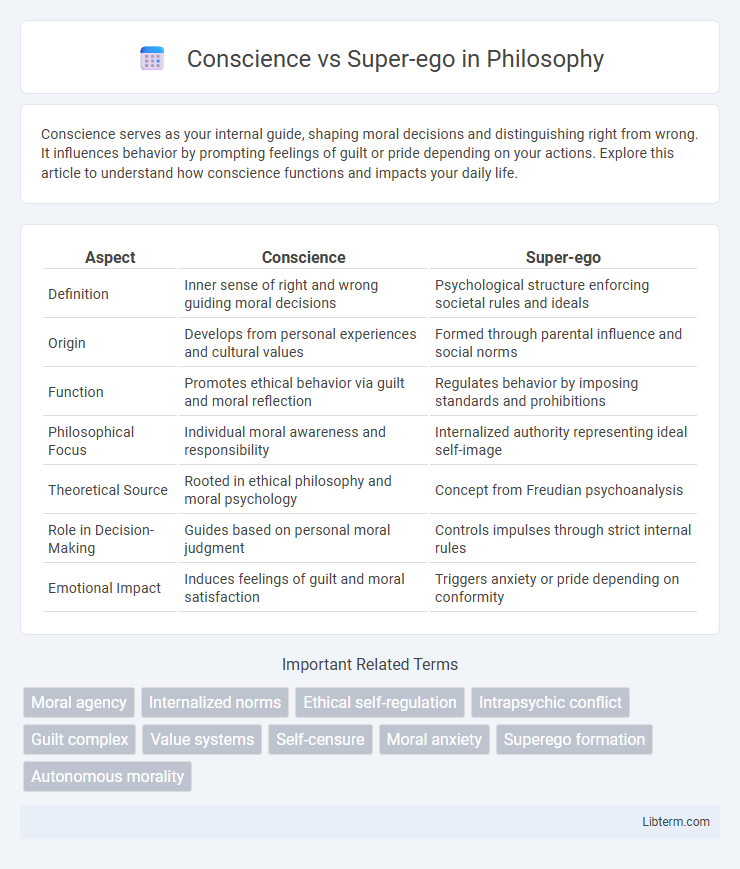Conscience serves as your internal guide, shaping moral decisions and distinguishing right from wrong. It influences behavior by prompting feelings of guilt or pride depending on your actions. Explore this article to understand how conscience functions and impacts your daily life.
Table of Comparison
| Aspect | Conscience | Super-ego |
|---|---|---|
| Definition | Inner sense of right and wrong guiding moral decisions | Psychological structure enforcing societal rules and ideals |
| Origin | Develops from personal experiences and cultural values | Formed through parental influence and social norms |
| Function | Promotes ethical behavior via guilt and moral reflection | Regulates behavior by imposing standards and prohibitions |
| Philosophical Focus | Individual moral awareness and responsibility | Internalized authority representing ideal self-image |
| Theoretical Source | Rooted in ethical philosophy and moral psychology | Concept from Freudian psychoanalysis |
| Role in Decision-Making | Guides based on personal moral judgment | Controls impulses through strict internal rules |
| Emotional Impact | Induces feelings of guilt and moral satisfaction | Triggers anxiety or pride depending on conformity |
Understanding Conscience: Definition and Origins
Conscience is an inner sense of right and wrong shaped by cultural, social, and personal experiences, acting as a moral compass guiding ethical behavior. It originates from early childhood interactions and internalized societal norms, reflecting an individual's values and judgments. Unlike the super-ego, which Freud defined as the part of the psyche enforcing rules and prohibitions, conscience operates more intuitively and emotionally in assessing moral dilemmas.
The Super-ego: Freud’s Concept Explained
The super-ego, according to Freud, represents the internalized moral standards and ideals acquired from parents and society, functioning as a critical and prohibitive agency in the psyche. It operates to suppress the urges of the id and persuades the ego to adopt moralistic goals, often manifesting as feelings of guilt or pride based on adherence to these ethical standards. Distinct from conscience, which specifically judges right from wrong, the super-ego encompasses a broader regulatory mechanism controlling behavior through ideals and prohibitions.
Key Differences Between Conscience and Super-ego
The conscience functions as an internal moral compass that judges actions based on personal values and societal norms, producing feelings of guilt or pride, while the super-ego operates as a psychological structure within Freud's psychoanalytic theory, representing internalized parental and societal standards to enforce moral behavior. Key differences include the conscience being more focused on immediate ethical judgments and emotional responses, whereas the super-ego encompasses broader aspects of reality and morality, integrating both conscious and unconscious elements to regulate behavior. The super-ego often conflicts with the id and ego, striving for perfection, while the conscience primarily monitors specific actions for right or wrong adherence.
Developmental Pathways: How Conscience and Super-ego Form
The conscience develops through internalizing parental and societal values during early childhood, guiding moral judgment and feelings of guilt. The super-ego forms as a more structured part of the psyche in Freudian theory, arising from the resolution of the Oedipus complex and incorporating ideals and prohibitions from authority figures. Both pathways emphasize the integration of external norms into the individual's moral framework, shaping self-regulation and ethical behavior.
Cultural Influences on Conscience and Super-ego
Cultural influences shape the development of conscience and super-ego by embedding societal norms, values, and moral codes that guide individual behavior and self-regulation. Diverse cultures emphasize distinct ethical frameworks and collective goals, which directly impact how the super-ego internalizes authority and cultural ideals. Cross-cultural psychology studies reveal variations in super-ego formation linked to differing child-rearing practices, religious beliefs, and social expectations.
The Role of Parents and Society
Parents and society play a crucial role in shaping the conscience and super-ego by instilling moral values, social norms, and ethical standards during early childhood development. The conscience reflects internalized judgments of right and wrong influenced by parental guidance, while the super-ego acts as an internal regulator, enforcing societal rules and expectations. Effective parental discipline combined with societal reinforcement strengthens the super-ego, promoting responsible behavior and social conformity.
Moral Decision-Making: Conscience vs Super-ego
Conscience functions as an internal moral compass, guiding individuals to distinguish right from wrong based on personal values and social norms. The super-ego operates as a psychological structure developed through internalized parental and societal standards, enforcing moral rules and inducing feelings of guilt or pride. In moral decision-making, conscience provides self-reflective judgments, while the super-ego imposes regulatory controls to align behavior with learned ethical principles.
Psychological Impacts of Super-ego Dominance
Super-ego dominance often leads to heightened feelings of guilt, anxiety, and self-criticism, impairing an individual's mental well-being and decision-making abilities. This psychological pressure stems from the super-ego's role in enforcing strict moral standards and societal expectations, which can create internal conflict and emotional distress. Persistent super-ego dominance may contribute to disorders such as obsessive-compulsive behavior, depression, and low self-esteem due to the overwhelming sense of inadequacy and fear of moral failure.
Nurturing a Healthy Conscience
Nurturing a healthy conscience involves balancing the moral standards of the super-ego with realistic self-assessment and empathy. The super-ego enforces societal rules and ideals, while a well-developed conscience allows for internalized values that guide ethical decisions without excessive guilt. Encouraging open reflection and emotional awareness fosters conscience growth, promoting mental well-being and moral integrity.
Integrating Conscience and Super-ego for Personal Growth
Integrating conscience and super-ego fosters balanced moral development by aligning ethical awareness with internalized societal standards, enhancing self-regulation and empathy. This synergy supports adaptive decision-making, promoting personal growth through the reconciliation of individual values with collective norms. Emphasizing this integration cultivates psychological resilience and deeper self-understanding in complex social environments.
Conscience Infographic

 libterm.com
libterm.com